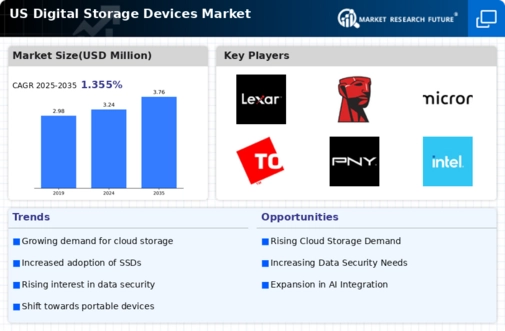The US Digital Storage Devices Market has been experiencing dynamic changes as technology progresses and consumer needs evolve. This competitive landscape is characterized by rapid innovation, with companies continually striving to enhance their product offerings and gain market share. The surge in data generation and the increasing need for efficient data management solutions have driven significant investments in this sector. Various players are vying for dominance by focusing on performance, reliability, storage capacity, and speed. As a result, market participants are not only competing on the basis of features but also on aspects like pricing, branding, and customer service.
The ever-growing trend of digitalization in various sectors further intensifies competition, prompting companies to establish strategic partnerships and leverage emerging technologies to meet consumer demands effectively. In the US Digital Storage Devices Market, SanDisk has established itself as a formidable force, renowned for its high-quality flash memory products. The company is widely recognized for its extensive range of consumer and enterprise solutions, including SD cards, USB flash drives, and solid-state drives (SSDs). SanDisk's strengths lie in its commitment to innovation and its ability to provide high-performance products tailored to meet the needs of diverse consumer segments.
With a strong brand reputation built over decades, SanDisk commands significant market presence and customer loyalty. The company's focus on research and development has allowed it to consistently introduce cutting-edge technology in data storage solutions, thereby solidifying its position in the highly competitive market. This emphasis on technological advancement enables SanDisk to cater to both casual users and professional applications, providing comprehensive solutions that enhance user experience and efficiency. Lexar, a prominent player in the US Digital Storage Devices Market, offers a diverse portfolio of flash memory and storage solutions aimed at various consumer demographics.
Key products from Lexar include SD cards, USB drives, and SSDs, each designed to provide reliability and high performance. The company is notable for its strategic focus on innovation, frequently introducing advanced technologies to enhance storage efficiency and speed. Lexar's market presence is bolstered by its brand affinity among photographers, videographers, and general consumers seeking reliable storage solutions. The company has engaged in strategic partnerships and potentially explored mergers and acquisitions to expand its product offerings and strengthen its competitive position in the market.
Through these efforts, Lexar continues to differentiate itself, positioning its products to meet the growing demands of content creators and everyday users alike, thus reinforcing its status as a significant contender in the US digital storage space.




















